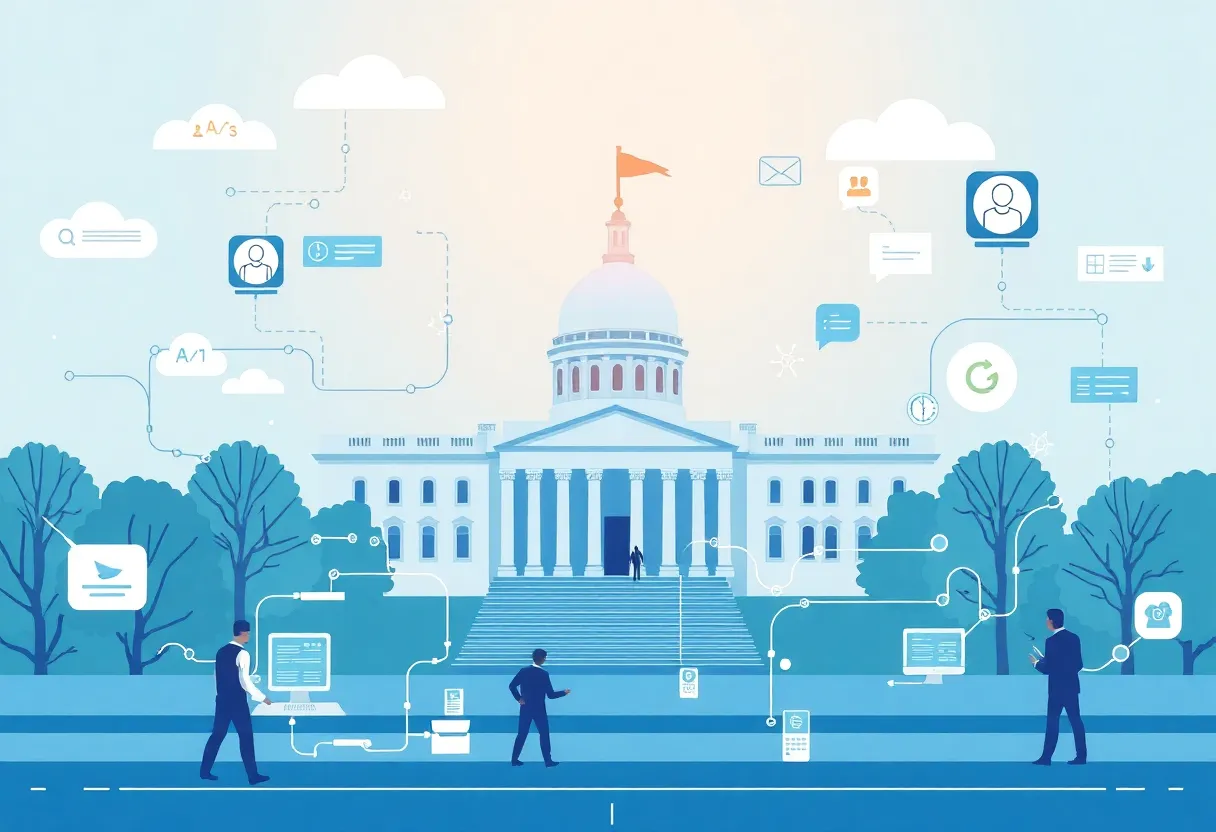

Artificial intelligence is driving efficiency and transformation in government services.
Article Sponsored by:
Real Internet Sales is a digital marketing agency located in Columbia, South Carolina. We specialize in website design and development, SEO, social media management, online advertising, AI integration, and workflow automation. Our services also include affiliate marketing and digital strategy.
Real Internet Sales also offer specialized programming for real estate firms, using IDX and RETS feeds to automatically populate MLS properties on their websites for improved property listings and sales. We also work with clients in the restaurant, tourism, and e-commerce industries to enhance their digital presence and streamline operations.
Artificial intelligence is quietly transforming government services by automating repetitive tasks. This integration enhances operational efficiency, transparency, and trust, allowing employees to focus on high-impact activities. Although challenges exist, the strategic implementation of AI presents a promising future for public service enhancements, from data management to human resources.
Imagine a world where the heavy lifting in government has been smoothly taken over by artificial intelligence (AI) technologies. Well, that world isn’t as far off as you might think! For decades, AI has been part of a quiet revolution, transforming labor by automating tedious tasks and letting humans focus more on what they do best—creative thinking and problem-solving.
Across various industries, from the bustling world of automobile manufacturing to the fast-paced realm of e-commerce, robotics and AI are boosting productivity. The repetitive tasks that once required countless human hours can now be handled more efficiently through automation. This increased efficiency isn’t just a blessing for businesses; it’s reshaping how public services are rendered too.
In the public sector, particularly in government services, AI is making waves through what some refer to as ‘quiet’ or ‘pragmatic’ AI. This approach emphasizes integrating AI seamlessly into existing processes. No need for extensive overhauls—these AI solutions fit neatly into the government’s workflow.
Take the case of robotic process automation (RPA), which is a fancy term for the automation of repetitive, rule-based tasks. From handling paperwork to data management, RPA is freeing up valuable time for employees to concentrate on high-impact activities that truly require human judgment.
One standout feature of AI in the public sector is its ability to enhance operational efficiency. With tools that can identify bottlenecks in workflows, government departments are better equipped to streamline processes. For instance, AI-driven workflow management can diagnose inefficiencies that might have otherwise gone unnoticed, leading to faster and more effective public service delivery.
But it’s not only about enhancing productivity. AI’s role in achieving transparency and trust within governmental dealings is noteworthy too. With the capabilities of predictive analytics, governments can improve budget planning and manage compliance in a much more effective manner. AI even assists in risk management by flagging inconsistencies in financial data, which is crucial for fraud detection.
In recent years, we’ve seen governments—including agencies like the U.S. State Department—grasp the benefits of AI. Their focus has shifted towards integrating AI tools for data organization and management tasks. By implementing these AI-driven solutions, governments are not only enhancing their operational efficiencies but also ensuring a better overall experience for citizens.
Even the realm of human resources in the public sector is stepping up its game. AI is helping automate the tedious tasks of resume screening and candidate matching. This promotes a more objective hiring process, ensuring that the best candidates are shining through without biases complicating matters.
Success in AI adoption hinges on effectively identifying specific problems that AI can solve. Targeted implementation is key! With the right strategies in place, the future looks bright. AI may well allow us to pursue more fulfilling objectives while ensuring that public services are enhanced for the citizens they serve.
With AI slowly revolutionizing how governments operate, the benefits are becoming clear. From improving customer service through AI-powered chatbots to optimizing energy usage in public buildings, the applications seem endless. The age of ‘quiet AI’ is upon us, offering a harmonious blend of technology and human touch in the public sector. Those mundane tasks may just become a thing of the past, and we are all in for a more efficient and satisfying future!
Inflation Takes a Leap as Consumer Prices Surge
Coinbase Reports Record-Breaking Fourth Quarter Earnings
Northville Financial Success Amid Winter Weather Challenges
France Invests €109 Billion in AI Development
Local Leaders Rally Against Tariffs in Southfield, Michigan
Trump Proposes Ending Penny Production
Historic Farmhouse Renovation Celebrates Black Culture
Michigan Pauses Electric Vehicle Charging Network Expansion
Oakland County Democrats Raise Concerns Over Tariff Impact
Federal Freeze on EV Charging Station Program Leaves States Scrambling

7001 St Andrews Rd #329 ,
Columbia, SC 29212,
United States
Phone: (+1) 803 708 5514
News Summary Nicholas Sakon, former fire chief of Unionville, Michigan, is charged with embezzling over…
News Summary Bahama Breeze has permanently closed its Troy restaurant as part of a strategy…
News Summary The Michigan Department of Natural Resources has announced a temporary halt to new…
News Summary Mercedes-Benz has announced the relocation of its North American headquarters to Sandy Springs,…
News Summary Memorial Day weekend is presenting an array of bargains on home goods, electronics,…
News Summary McDonald's has announced the closure of all five CosMc's locations, less than two…